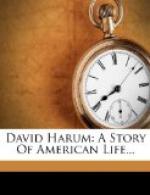“Feelin’ all right now? whisky hain’t made ye liable to no disorderly conduct, has it?” he asked with a laugh.
“Yes, thank you,” was the reply, “the warm things are real comfortin’, ‘n’ I guess I hain’t had licker enough to make me want to throw things. You got a kind streak in ye, Dave Harum, if you did send me this here note—but I s’pose ye know your own bus’nis,” she added with a sigh of resignation. “I ben fearin’ fer a good while ‘t I couldn’t hold on t’ that prop’ty, an’ I don’t know but what you might’s well git it as ’Zeke Swinney, though I ben hopin’ ’gainst hope that Charley ’d be able to do more ’n he has.”
“Let’s see the note,” said David curtly. “H’m, humph, ’regret to say that I have been instructed by Mr. Harum’—wa’al, h’m’m, cal’lated to clear his own skirts anyway—h’m’m—’must be closed up without further delay’ (John’s eye caught the little white stocking which still lay on his desk)—wa’al, yes, that’s about what I told Mr. Lenox to say fur’s the bus’nis part’s concerned—I might ‘a’ done my own regrettin’ if I’d wrote the note myself.” (John said something to himself.) “’T ain’t the pleasantest thing in the world fer ye, I allow, but then you see, bus’nis is bus’nis.”
John heard David clear his throat, and there was a hiss in the open fire. Mrs. Cullom was silent, and David resumed:
“You see, Mis’ Cullom, it’s like this. I ben thinkin’ of this matter fer a good while. That place ain’t ben no real good to ye sence the first year you signed that morgidge. You hain’t scurcely more’n made ends meet, let alone the int’rist, an’ it’s ben simply a question o’ time, an’ who’d git the prop’ty in the long run fer some years. I reckoned, same as you did, that Charley ’d mebbe come to the front—but he hain’t done it, an’ ’t ain’t likely he ever will. Charley’s a likely ’nough boy some ways, but he hain’t got much ‘git there’ in his make-up, not more’n enough fer one anyhow, I reckon. That’s about the size on’t, ain’t it?”
Mrs. Cullom murmured a feeble admission that she was “’fraid it was.”
“Wa’al,” resumed Mr. Harum, “I see how things was goin’, an’ I see that unless I played euchre, ’Zeke Swinney ‘d git that prop’ty, an’ whether I wanted it myself or not, I didn’t cal’late he sh’d git it anyway. He put a spoke in my wheel once, an’ I hain’t forgot it. But that hain’t neither here nor there. Wa’al,” after a short pause, “you know I helped ye pull the thing along on the chance, as ye may say, that you an’ your son ’d somehow make a go on’t.”
“You ben very kind, so fur,” said the widow faintly.
“Don’t ye say that, don’t ye say that,” protested David. “’T wa’n’t no kindness. It was jest bus’nis: I wa’n’t takin’ no chances, an’ I s’pose I might let the thing run a spell longer if I c’d see any use in’t. But the’ ain’t, an’ so I ast ye to come up this mornin’ so ’t we c’d settle the thing up without no fuss, nor trouble, nor lawyer’s fees, nor nothin’. I’ve got the papers all drawed, an’ John—Mr. Lenox—here to take the acknowlidgments. You hain’t no objection to windin’ the thing up this mornin’, have ye?”




